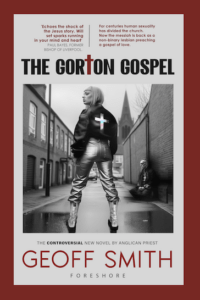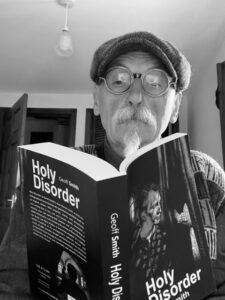There is timing, and there’s timing.
HOLY DISORDER, Geoff Smith’s semi-autobiographical novel, is set in a time of change and challenge for the Church of England, the 1970s. The question of women priests is coming to a head, as are issues of human sexuality and union with the Methodists. The protagonist Dave, a working-class lad from Manchester, is on his own star-crossed trajectory from theological college to ordination through a parish curacy to becoming senior curate at a cathedral and eventually rising to the dizzy heights of being chaplain to the local bishop, with a bit of extra-pastoral sex thrown in for good measure.
The protagonist in Geoff Smith’s follow up, THE GORTON GOSPEL, is no less troubled, if not far more controversial. The story of Grace Givens, a non-binary lesbian, who returns to the struggling Manchester community of Gorton amid claims of them being the new Messiah, is braced for maximum impact at a time when the Church of England is facing its biggest crisis in modern times. The archbishop of Canterbury has been forced to resign, other senior figures are facing calls to quit and the church is reeling from its shameful failures over a prolific and sadistic child abuser.
Smith, who remains, for now, an Anglican priest, insists THE GORTON GOSPEL is, first and foremost, a hymn of praise to the Manchester he remembers. “I was born and brought up in Manchester,” he says. “When I was five my parents bought a house in Gorton opposite Sunny Brow Park. “I have always been proud of my Manchester roots, the football teams, the Free Trade Hall, the Ship Canal and more recently the music. I went to school in the centre of the city Manchester Central Grammar School in Whitworth Street. I moved away from Manchester, where I was Vicar of St John the Baptist, Little Hulton, in 1978, two years before Shaun Ryder formed the Happy Mondays, also in Little Hulton, bad timing on my part?”
Quite possibly. The timing of the publication of THE GORTON GOSPEL, however, could not be any less premeditated. “It’s a challenge for our times,” Smith says, “and a challenge which stems from three concerns that I have. What would happen if Jesus returned today in what some evangelical Christians describe ‘The Rapture’. Would he be welcomed rapturously? How would he present himself? Jesus brought a challenge to the spiritual leaders of his day as Grace Givens brings a challenge to the Church I describe today.”
Smith, who was ordained in 1969 in Sheffield and has been a curate, a vicar and a cathedral canon, says his main inspiration for THE GORTON GOSPEL story was Professor David Ford’s commentary on John’s Gospel with his emphasis on love at the heart of the Gospel. “There is a story I love to tell about the elderly St John, asked to speak to his congregation in the first century AD, he simply says, ‘little children ‘love one another’,” Smith said. “In my understanding of the story the Gospels tell us that love is always redemptive and in the character of Grace Givens in the Gorton Gospel, I try to show that to be true. I made my main character a non-binary woman using the pro-noun ‘they’ purposefully. I made Grace the person they are in my story because ‘they’ are a challenge to the church today. The world is changing and for the better. As an early Methodist Church report describes it, alongside tradition and scripture, the Church needs to recognise ‘the spirit of the age’. The Living in Love and Faith debate in the Church of England is so important to the future of the national church and the church is getting it so very badly wrong. I hope that my story helps people rethink their prejudices.”
In THE GORTON GOSPEL, Grace Givens is born and discovers Jesus in a mobile cinema showing a film about the life of Jesus. As ‘they’ grow older their understanding changes as they begin to cause a reaction in their neighbourhood by performing miracles. Eventually, Grace leaves Manchester but then returns to fulfil the mission they believe has been given to them by God.
"The Living in Love and Faith debate in the Church of England is so important to the future of the national church and the church is getting it so very badly wrong. I hope that my story helps people rethink their prejudices." Geoff Smith.
In THE GORTON GOSPEL, Grace Givens is born and discovers Jesus in a mobile cinema showing a film about the life of Jesus. As ‘they’ grow older their understanding changes as they begin to cause a reaction in their neighbourhood by performing miracles. Eventually, Grace leaves Manchester but then returns to fulfil the mission they believe has been given to them by God.
The narrative follows much of the life of Jesus but has been translated into Mancunian.
Approaching Jerusalem
Can life be lightly discarded?
For Grace, returning to Manchester, to Gorton, involved risk. They knew that ahead of them was the risk of rejection, like Jesus two thousand years before them, they were returning to the place they had left. They knew that it was time to witness the truth at the heart of a lie, shared all those years ago on a dusty road on the way to Emmaus.
The question: Who do you say that I am?
It was, as Grace knew, deep in their heart, an almost unanswerable question. But as they headed towards the City they were setting in motion the wheels that would lead to confrontation and possibly death.
From what they knew, had studied, had considered, they were fully aware, as Tim had explained in conversation, and declared from the pulpit, the church was called to discover ways of dying creatively in order to transform the world with love. Such a creative death was to be found on the cross, in the passion, this they both knew and yet feared, as they feared the consequences of returning to their home town and home City.
The Church’s long history had somehow failed to convince the people that had rejected them for being non-binary, had rejected them for their gender difference, had rejected them for their apparent ability to perform miracles and share truth through simple stories that renewal, journeying, death, resurrection, formed a pattern of which they were a part and a history which they shared, of journeying forward in the potential transforming power of the creation of the word become flesh.
For Grace and their friends the road leading to the City had to be trodden in companionship with the Messiah of two thousand years ago. The one known as Jesus, as they were known as Carpenter.
The Son of a Carpenter who was driven out of the Village, as Grace was driven out of Gorton. Despite naming the one they followed, not as others named him, but as his disciples named him Christ. The decisive event of human history, the one in whom love became embodied in a person, in flesh and blood.
This decisive event for the Church then, was not a decisive event for the Church now, as the Bishop had made only too clear to Tim. There is, he had said, no need for the Church to take any notice of a girl, a non-binary girl at that, claiming to be the new Messiah.
Tim had protested Grace was not making any such claim. All that is happening is that Carpenter is making it clear that love will transform so much that is at odds with the world today. Love can still heal people, love can still help people as they work through the many problems that life throws in their way. Poverty, homelessness, sickness, a lack of confidence, evil spirits and possession.
Tim had argued with the Bishop as best he could, even quoting an earlier German theologian, saying that Grace, or Carpenter, had been given a vocational title by others and had not claimed it for herself.
Such a title, Tim argued, was particularly appropriate in the City and in his parish in Gorton, where people so desperately needed to be set free, to see the power of faith like a light over the City, the transformation of what the church had preached. That a new messianic age of justice and peace would rise. That God would once again be seen as the Lord of Humankind, that the City they both served would be changed into a place of blessedness.

Grace Givens, a non-binary lesbian, returns to struggling Gorton, Manchester, where claims of them being the new Messiah spark miraculous healings. As hope reignites in the community, opposition from the Church grows, revealing the darker implications of faith and the unexpected nature of true healing.
THE GORTON GOSPEL is available on pre-order in paperback £9.50, with a foreword by Paul Bayes, former Bishop of Liverpool.

GEOFF SMITH is an English novelist and poet and the author of Holy Disorder (Foreshore Publishing) and Red Kites and Haiku (Caldew Press).